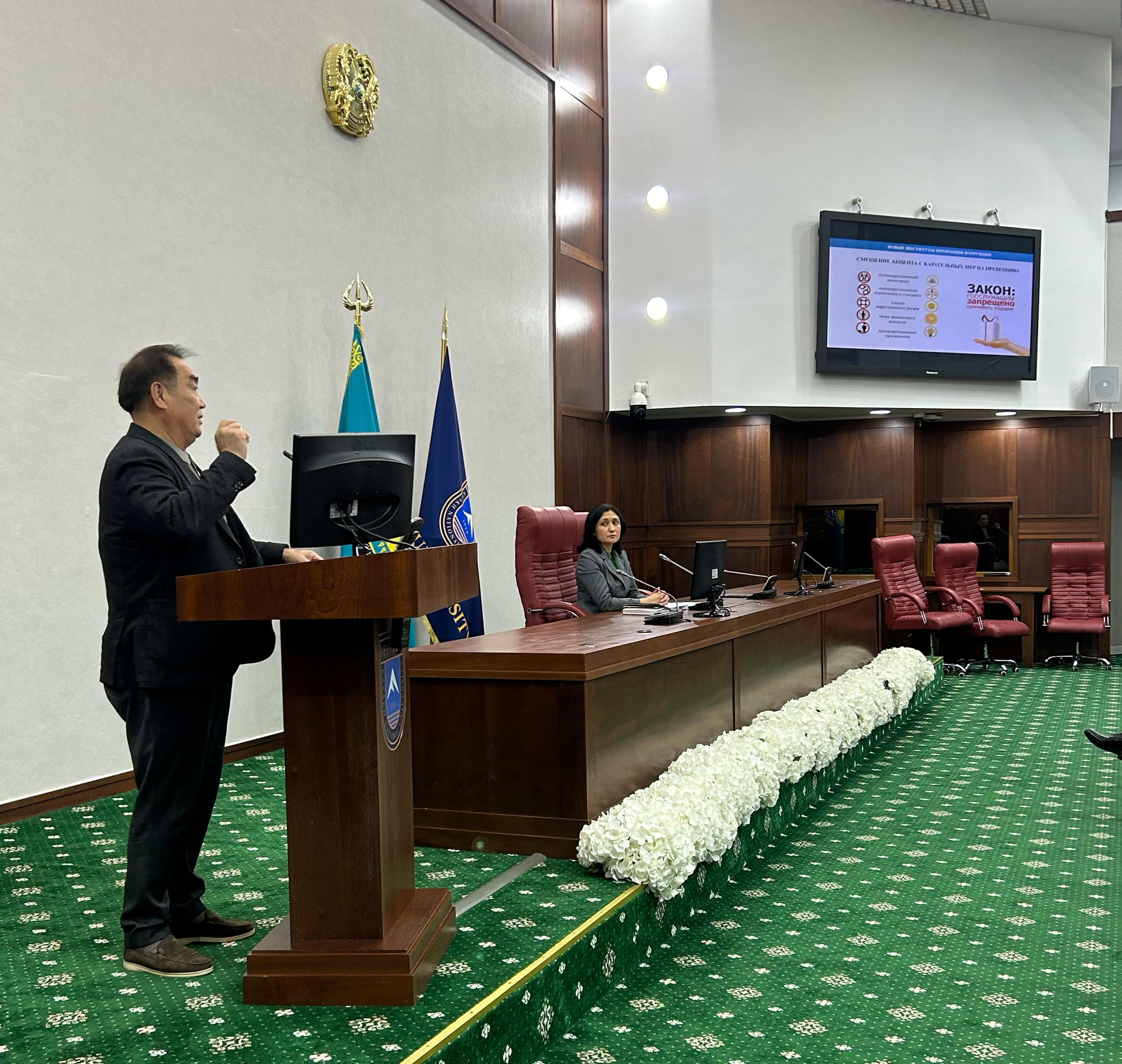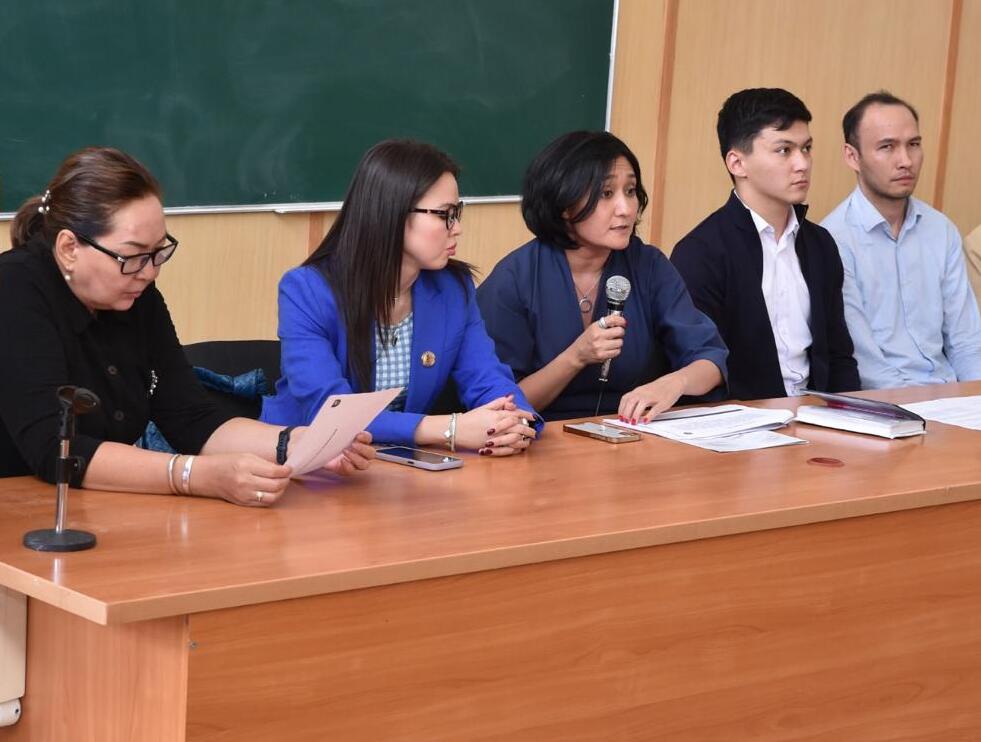- Main
- Compliance Control Service
- Review of the Anti-Corruption Policy of NJC "Al-Farabi Kazakh National University"
Review of the Anti-Corruption Policy of NJC "Al-Farabi Kazakh National University"

In the Concept of anti-corruption policy of the Republic of Kazakhstan for 2022-2026, developed on behalf of the President of Kazakhstan Kasym-Jomart Tokayev, it is noted that Kazakhstan aims to move from routine anti-corruption to a fundamental change in public consciousness, the public's rejection of any form of corruption and nepotism, the priority of preventive measures.
According to the Law of the Republic of Kazakhstan dated November 18, 2015 № 410-V "On Combating Corruption", corruption is the illegal use by persons holding responsible public office, persons authorized to perform public functions, persons equivalent to persons authorized to perform public functions, officials of their official (service) powers and related opportunities in order to obtain or extract personally or through intermediaries property (non-property) benefits and advantages
All state bodies, organizations, subjects of quasi-state sector and officials are obliged to combat corruption within their competence.
In NJC "Al-Farabi Kazakh National University" for the purpose of formation in the University based on zero tolerance to any manifestations of corruption, free from corruption risks and factors leading to the formation of corruption-prone areas in the University adopted "Anti-corruption policy" (approved by the Decision of the Board of the University from 27.01.2023 № 2-z) developed in accordance with the anti-corruption legislation of the Republic of Kazakhstan, the requirements of the international standard ISO 37001-2016 "Management systems for combating corruption".
Thus, according to the Anti-Corruption Policy, the following measures to prevent and counteract corruption are envisaged:
1. Formation of a culture of rejection of corruption. In order to form anti-corruption behavior among officials, authorized persons and employees of the University, general rules and principles of employee behavior are established, which affect the ethics of business relations and are aimed at forming ethical, conscientious employee behavior. Employees know what is proper and appropriate behavior when confronted with ethical issues. The University encourages employee behavior that complies with the principles and norms established by the Policy and other documents of the University. Also elements of building a culture of rejection of corruption are: 1) "Tone from the top": the Board of Directors, the Management Board in order to create unified accepted norms of ethical behavior set the "tone from the top". The Board of Directors and the Management Board do not expect the University employees to behave differently from their own behavior. Board of Directors, Management Board to set the "tone from the top": demonstrate standards of ethical and business behavior by example;
2) "Speak-Up": employees should report facts of corrupt behavior known to them at the first opportunity. Employees who have reasonable suspicions of violations of anti-corruption laws or ethical norms set out in the Policy, Code of Corporate Ethics should, first of all, inform their manager, who is in charge of the situation and who can effectively respond to it and the copliance control unit;
3) Involving and informing stakeholders about the functioning of the anti-corruption system, this activity is planned within the framework of setting anti-corruption objectives;
4) the University ensures proper and appropriate informing and training of personnel on anti-corruption issues. Employees of the University are informed and trained on anti-corruption issues at the time of employment and regularly at least once a year;
5) when interacting with counterparties, business partners, the University informs about the anti-corruption standards of the University's activities, including, if necessary, by including certain provisions on compliance with anti-corruption standards in contracts;
6) implementation of the anti-corruption standard. The University shall approve an anti-corruption standard, the purpose of which is to establish a system of recommendations for the University personnel aimed at preventing corruption in the performance of their official duties and achieving an atmosphere of intolerance to any manifestations of corruption.
2. Monitoring and control in the field of anti-corruption.
Regular monitoring and control in the field of anti-corruption contributes to the prevention and detection of corruption offenses and contains the following measures:
1) monitoring of anti-corruption legislation of the Republic of Kazakhstan, international acts affecting the University's activities in order to bring its internal documents in compliance with the changing requirements of anti-corruption legislation;
2) analysis of appeals of individuals and legal entities on facts having signs of corruption offenses on the part of officials, authorized persons and employees of the University;
3) monitoring of mass media for mentioning the University's name in connection with corruption manifestations;
4) Legal examination of key internal documents of the University and their drafts to be approved for the presence in them of provisions contributing to the emergence of corruption-related factors and development of proposals for their elimination;
5) Identification and assessment of corruption risks.
3. Corruption risk assessment.
The purpose of corruption risk assessment is to identify specific processes, areas in the University's activities, the implementation of which has the highest probability of committing corruption offenses by University employees in order to obtain personal benefits, identification of conditions conducive to the commission of corruption offenses, corruption schemes. Based on the results of the corruption risk analysis, measures are developed and controls are defined to reduce significant corruption risks and improve the effectiveness of the anti-corruption system.
4. Measures in the field of personnel management.
The University observes the principles of objectivity, honesty in making personnel decisions. In order to eliminate corruption risks in the recruitment, evaluation, promotion and dismissal of personnel, the University:
1) Develops and approves in the prescribed manner transparent procedures for the selection and hiring of personnel, occupying vacant positions, conducting selection on a competitive basis and approves appropriate qualification requirements for the position;
2) Checks candidates for employment before making a decision on commencement or continuation of employment for their reliability and absence of conflict of interest;
3) Evaluate personnel performance and pay remuneration based on the performance of its key performance indicators and professional achievements;
4) Decide on promotion to a higher position based on the business qualities and qualifications of the employee;
5) Carry out the procedure of termination of labor relations with the employee on the grounds stipulated by the legislation of the Republic of Kazakhstan and internal documents of the University.
The terms and conditions of labor contracts of employees stipulate obligations and responsibility for the employee's compliance with anti-corruption legislation, as well as the possibility of disciplinary action for violation of such obligations. 5. Conflict of interest management.
Conflict of interest management is an important component of the anti-corruption system. The University pays great attention to preventing the realization of risks related to conflict of interest and their settlement. In order to regulate the processes related to the emergence of a conflict of interest, the University approves relevant internal documents on the settlement and prevention of conflicts of interest. Officials, authorized persons and employees of the University in the performance of their official (job) duties are obliged to be guided by the interests of the University and avoid situations or circumstances in which their personal interests will affect the objectivity and integrity of the performance of their official (job) duties and contradict the interests of the University. All employees of the University undergo annual training on issues related to conflict of interest.
6. Official checks and investigations on appeals of corruption offenses.
Within the framework of received appeals of individuals and legal entities and other reports on corruption offenses, the University shall conduct an audit or official investigation with the participation of the relevant structural subdivisions vested with appropriate powers, in accordance with the procedure provided for by the internal documents of the University.
Other news


